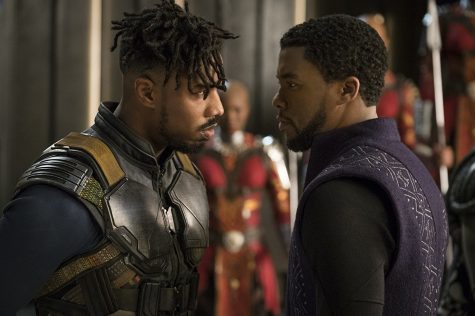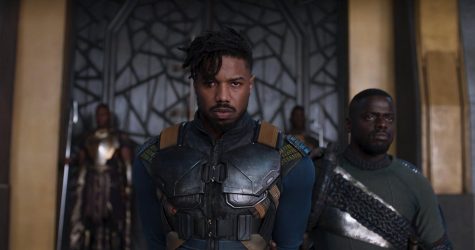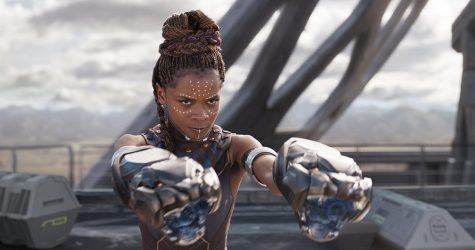“Black Panther” is a refreshingly original superhero film
Tired of run-of-the-mill superhero movies? Black Panther, Marvel’s latest, redefines the genre.
There are so many superhero movies out these days. Understandably, this has caused some people to ask the question: what’s the point of seeing one now? Many of these films follow the same formula, usually featuring star actors preventing the CGI destruction of beloved U.S. cities. The upside to this, is that it has allowed us to dig deeper into the back catalogs of industry giants such as Marvel to see more of the characters with less exposure. Black Panther is a prime example of this. He’s one of the most important characters of color in superhero lore, and this February fans were finally treated to the feature length, big screen debut for the character.
This has caused a lot of buzz, since the character is one of Marvel’s few black superheroes. With Ryan Coogler in the director’s chair, and a cast featuring such talent as Chadwick Boseman, Michael B. Jordan, Lupita Nyong’o, Daniel Kaluuya and Forest Whitaker, things seemed to be on the right track.

Before this, Coogler had directed the indie hit “Fruitvale Station,” and the Oscar-nominated continuation of the Rocky series “Creed.” Hiring a black director is crucial to this story for many reasons. The plot and characters of “Black Panther” are very much ingrained in black identity and culture. Though originally created by white writers (hey, it was the 70s), the character has been reclaimed over the years by such talented scribes as Ta-Nehisi Coates and Roxane Gay, placing the character in line with his nationality.
Ryan Coogler has proven with his previous works to have a knack for polished, well-written blockbusters, and this is no exception. It’s on a bigger scale than all of his other works, showcasing the beautiful African landscapes of Wakanda mixed with advanced technological achievements. It looks like nothing we’ve ever seen in a Marvel film, being so far removed from the drab gray streets of the major U.S. cities in previous efforts in the cinematic universe. Visually, the film is dazzling beginning to end, bursting with life and innovation on the screen.
In his previous two collaborations with director Ryan Coogler, Michael B. Jordan played the lead role. Here, cast somewhat against type, he plays the film’s antagonist, Erik Killmonger. Jordan doesn’t dumb it down for a “superhero” movie like some actors tend to do. He gives it his all, delivering one of his better performances. There is great energy whenever he is on screen, demanding your attention. You can feel Killmonger’s pain and frustration, and this is what makes him a realistic villain. There is a perfect marriage of screenwriting and performance at play here. The writing is what makes his motives believable, but the acting by Jordan is what gives it weight.

Chadwick Boseman plays T’Challa, the Black Panther and prince of Wakonda once more after his previous outing in “Captain America: Civil War.” Boseman plays the character as a more thoughtful hero. He’s not dropping one-liners every scene, or always acting overly theatrical. He plays the character as a calculating man with the tendencies of a warrior. Once more, this is a refreshing take on the superhero tropes and mainstays of previous outings in the MCU.
A strong supporting cast also aides the film, with special mention to Lupita Nyong’o as Nakia, T’challa’s ex, Danai Gurria as Okoye, a badass warrior who acts as T’Challa’s partner in crime and Daniel Kaluuya (star of “Get Out”) as W’kabi. Letitia Wright is also good as the spunky Shuri, who acts as the film’s equivalent of Bond’s Q. The cast is only one of the many elements in the film that clicks into place perfectly, showcasing much of the talented actors of color that are grossly underutilized in the industry.

Despite the dazzling, large-scale visuals, the main conflict of the film is notably more personal. It’s about the power struggle between T’Challa and Killmonger, who are connected in ways I’m not at liberty to discuss without spoiling, and what they both think is best for their respective country. Killmonger doesn’t believe in Wakanda keeping their resources away from the world in the guise of a third world country. T’Challa believes they should stay hidden to keep these resources safe. This is effective not only because it resonates with relevant modern issues, but because it doesn’t paint Killmonger as a one-note villain. He’s his own character with his own motivations and opinions that happen to clash with T’Challa’s.
“Black Panther” is the first major superhero movie starring a predominantly black cast. But it marks an even larger shift for American film. White directors have been making films that mesh mainstream appeal with intelligent subtext for decades. Meanwhile, well-made work by black directors has been largely overlooked by mainstream audiences, finding its home in small independent movie houses across the country while Tyler Perry movies reap in immense amounts of money at the box office. With “Black Panther,” Coogler has managed to make a film able to simultaneously appeal to both crowds. It is a superhero film that is skillfully made and entertaining, but not at the expense of ignoring its black identity.
There is a quote from French New Wave director Francois Truffaut that explains the joy of watching the uplifted faces of filmgoers, illuminated by the light of the screen. Seeing Coogler’s film reminded me of this joy. It is not only a great film; it is a great film to watch with an audience. I found myself frequently stealing glances at fellow members of the crowd and saw everybody affected by the film’s humor, by it’s humanity, by it’s performances, more than at any superhero movie or popular film in general I’ve been at in a longtime. Don’t take the film for granted just because of the Marvel label. We need more films like this.
Your donation will support the student journalists of West High School. Your contribution will allow us to purchase Scholarship Yearbooks, newsroom equipment and cover our annual website hosting costs.

Harry Westergaard is a senior at West High and this is his third year on staff. He does a little bit of everything on staff, working primarily as the Arts...


